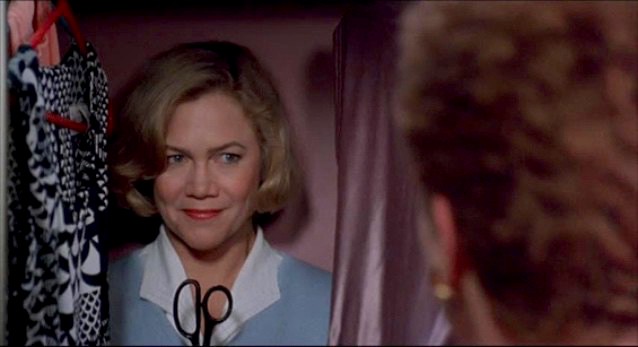by Salim Garami

What's good?
The existence of Serial Mom 25 years ago establishes that America’s current obsession with true crime stories – with the likes of Serial and American Crime Story and the never-ending avalanche of Netflix documentaries – is not something remotely new to our day and age. Hell, it wasn’t even new to 1994; many of the social observations Serial Mom makes arguably were already well before up to the previous year’s The Positively True Adventures of the Alleged Texas Cheerleader-Murdering Mom. There is little prophetic in the satire but there is A LOT of scary forecasting regarding the OJ Simpson murder case that was just around the corner at the time of its release...
Our collective fascination with the true heinous crime stories, that's bled on over from late-night programming to award-winning prestige television and podcastings, could be used to explain part of why Serial Mom has developed a devoted cult following after its financial underperformance. Though that explanation forgets that John Waters has an inherent gift for cult.
Serial Mom happens to be the film of his career that best mixes Waters’ two major strands of subject matter. With Kathleen Turner’s housewife character Beverly Sutphin and her double life getting a kick out of sending vulgar notes and crank calls to her poor neighbor Dottie and murdering anybody who crosses her in the slightest way, Waters found the perfect premise for his preoccupations: subverting pleasant 50s and 60s nuclear suburbia (such as in his most popular film Hairspray) and his early roots as a shock transgression facilitator (as his most notorious film Pink Flamingos).

Turner and Waters work so well off of each other that it’s kind of shocking that they didn’t make any movies together after this. With the most polished filmmaking of his entire career, Waters and cinematographer Robert Stevens clean up and brightens shots to a bubbly sunny mood. Turner's radiance turns up to 11 on the most unnerving homebody who gently scolds for profanity and gum-chewing. But when Turner guides the scenes to a more sinister bent with either a passing look of extreme contempt or relishing any line reading of coarse indecency, Waters is very happy to amplify her shocking violence; even something as small as swatting a fly in the beginning of the movie feels offensive. There’s never the sense of push-pull in who’s got control over the scene; there is just so much chemistry between Waters’ aesthetic and Turner’s enjoyment of the material. Together they more than sell the vile deviance hiding inside your local suburbs.
Waters sneaks in ominous signs of what Beverly is up to next without diluting the ironic “horror movie” approach every time she kills. Somehow, in every bit of the 93 minutes that make up Serial Mom, none of Beverly’s assaults cease to feel shocking in their abruptness, no matter how gleefully camp the scenario: killing somebody with a turkey leg, smacking them over the head with a payphone, or immolating victims on stage at a punk rock show called Camel Lips (played by L7).
Turner has a very wonderful supporting cast to extend that warm domestic atmosphere in Sam Waterston, Ricki Lake, Matthew Lillard (respectively as Beverly’s oblivious husband, lovesick daughter, and grotesquerie-obsessed son – all embodying these traits in affably charming ways), Mink Stole and Mary Jo Catlett (as Beverly’s suspecting and putupon neighbors).

Lillard’s character Chip (who is essentially “what if Lillard’s character in Scream wasn’t so obnoxious?”) feels like the key to figuring out what Waters really wanted to do with Serial Mom: display his affinity for gross out psycho killer movies from the 1950s and 1960s. Chip works in a video store and his room is adorned with movie posters and pictures of gore shots (as a sweet touch, there is also the occasional photo of his girlfriend Birdie). Almost as a mockery of the concept that “loving violent movies will make you a violent killer”, Beverly encourages her horror movie aficionado son and eagerly insists on rewatching a tongue-ripping sequence from Blood Feast (directed by Waters’ long-time hero, Herschell Gordon Lewis, the Godfather of Gore) and Waters in turn tries to use the same visual language as the likes of Blood Feast and Strait-Jacket (with the aid of editors Janice Hampton and Erica Higgins) to make his own psycho killer movie. Instead of watching our killer brood and stare into mirrors, we get to watch her make a healthy breakfast for her family and hilariously seduce her husband in a ridiculously athletic sex scene.
Once the movie deals with Beverly’s capture and trial, it doesn’t have as much energy. But Turner doesn’t lose her grip on the scenes and arguably gets more space to work as Beverly acts as her own advocate (while the family regresses into exploiting her newfound celebrity). While Waters isn’t that successful in tying the celebrity and the trial threads together, there’s still a sense that he’s excited with where Beverly’s trajectory is going now. In any case, Serial Mom is a movie that’s clearly the result of two personalities meshing well enough that no matter how much it slows down before the credits roll, it remains a wild ride.
